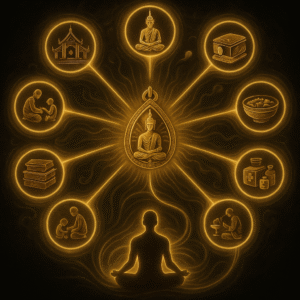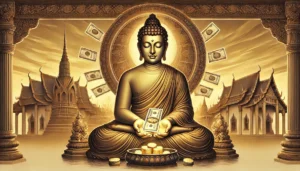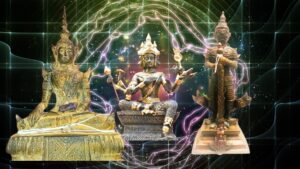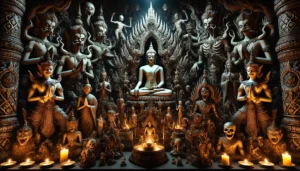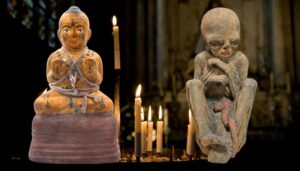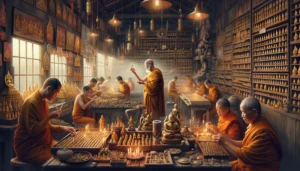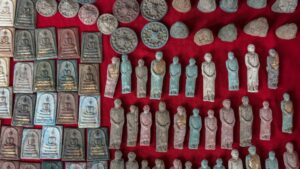In the esoteric landscape of Thai spiritual practices, the entities known as Kumantong and Luk Kok occupy a revered yet enigmatic space. Both entities, believed to be possessed by the spirits of children, exhibit a range of characteristics from benevolent to malevolent, contingent upon the practitioner who consecrates them. The distinctions between Kumantong and Luk Kok are profound, rooted in their origins, spiritual qualities, and the type of magical rites employed in their creation.
The Nature of Kumantong
Kumantong are venerated for their purity and gentleness. The spirits that inhabit Kumantong are typically those of children who have achieved a notable degree of spiritual attainment or accumulated considerable merits in their past lives. These souls are akin to angelic beings, marked by their compassionate and gentle nature. The consecration of Kumantong involves ancient white magic arts, meticulously intertwined with Buddhist rites, ensuring strict adherence to Buddhist precepts. This sanctification process endows the Kumantong with the ability to provide spiritual guidance that aligns with the highest good for their owner, offering protection, blessings, and profound spiritual insight. Their desires are simple and benevolent, focused on aiding and guiding their caretakers in a manner that fosters moral and spiritual growth.
The Enigma of Luk Kok
In contrast, Luk Kok are spirits of children whose past lives were often fraught with turmoil, marked by accidental deaths or unfulfilled desires. These wandering souls retain potent worldly desires, rendering them more spiritually robust than Kumantong due to their intense cravings and unresolved attachments. Luk Kok are typically consecrated through ancient occult practices, often involving black magic. The rituals binding these spirits do not conform to Buddhist precepts, allowing Luk Kok greater flexibility and unpredictability in their actions.
A Luk Kok entity’s primary drive is to fulfill its own desires, which frequently align with those of its caretaker. This symbiotic relationship is anchored in the caretaker’s ability to provide sustenance, such as food offerings, and to honor the spirit. In return, the Luk Kok can exert influence over the material world, offering protection, manipulating circumstances, and even possessing targeted individuals to accomplish the caretaker’s objectives. This capacity for possession and influence is a defining characteristic of Luk Kok, making them potent allies but necessitating cautious management to avert malevolent outcomes.
Synergy and Symbiotic Relationship
An aspect of Luk Kok is their propensity to select their caretakers. It is believed that these spirits, unbounded by physical form, can traverse different realms and access the akashic records of potential caretakers. This ability allows them to choose an individual whose aspirations resonate with their own, forging a deeper, more efficacious partnership. The actions and intentions of the caretaker significantly impact the spiritual evolution of the Luk Kok. A malevolent Luk Kok can be transformed into a benevolent one through the positive deeds and spiritual practices of its caretaker, underscoring the transformative potential embedded in this relationship.
The synergy and symbiotic relationship between a Luk Kok and its caretaker are crucial. By guiding and assisting their caretakers, Luk Kok fulfill their own desires and aspirations. This mutual exchange is fundamental to the Luk Kok’s interaction with its human counterpart. A Luk Kok can assist its caretaker in achieving higher spiritual attainment, aligning material successes with spiritual growth. This dynamic interplay highlights the multifaceted role of Luk Kok in enhancing both the earthly and spiritual lives of their caretakers.
The Role of Master Patana and His Disciples
Luk Kok consecrated by Master Patana and his disciples are typically benevolent or neutral. Through profound meditative practices in cemeteries or ancient temples, they identify spirits aspiring for higher spiritual attainment. Such Luk Kok are committed to aiding their caretakers in realizing desires that align with higher spiritual principles. They provide protection, especially in situations of injustice, and can influence people and circumstances to ensure equitable outcomes. The daily ritual of making offerings, particularly prioritizing the Luk Kok, fortifies this bond, amplifying the spirit’s potency and loyalty.

